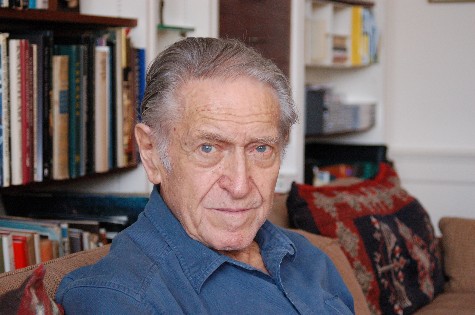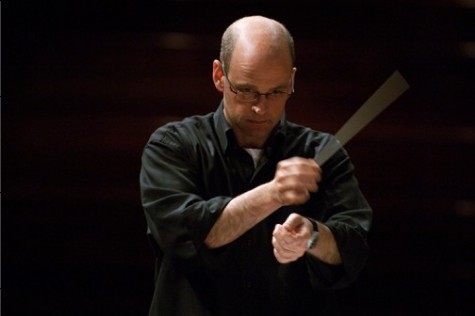Classical Music Review: Boston Modern Orchestra Project

The late composer Leon Kirchner: his composition was the most impressive work on the BMOP’s program and was gloriously performed.
Reviewed By Caldwell Titcomb
The Jordan Hall stage was crammed full of 70 players for the season’s final concert by the Boston Modern Orchestra Project (BMOP) on May 28. Under its artistic director Gil Rose, we heard music by five composers, the earliest dating from 1989. For two works the distinguished baritone Sanford Sylvan (b. 1953) was the soloist.
The concert opened with “Legerdemain” by Anthony De Ritis (b. 1968), who heads the Northeastern University music department. Composed in 1994, this 11-minute piece augments a large orchestra with electronic sounds. It starts with big percussion crashes alternating with soft, mysterious chords, and ends with a fortissimo climax. Rose conducted mainly in quadruple time, though the music did not really convey a strong sense of meter.
“American Muse” (1999), written for and premiered by baritone Sylvan, is a 20-minute set of four songs by Steven Stucky (b. 1949), a 2003 Pulitzer Prize winner. The title of the work comes from the opening of Steven Vincent Benét’s “John Brown’s Body”: “American Muse, whose strong and diverse heart/So many men have tried to understand.” Stucky says he “looked for texts that somehow dealt with American-ness.”
First off was “American Lights, Seen From Off Abroad” (1957) by John Berryman (1914-72), which consists of 21 rhymed couplets. This amusing text was conveyed by music in the swing tradition, coming to an abrupt percussive end. Next came “Buffalo Bill’s” by E. E. Cummings (1894-1962), which had some phrases that seemed to be a homage to Britten’s “War Requiem.” “Delaware Water Gap” by A. R. Ammons (1926-2001) featured tinkling sounds from glockenspiel and celesta and moved without break to the familiar “I Hear America Singing” (1867) by Walt Whitman (1819-92). Sylvan captured well the varied character of the words.
“Music for Orchestra II” by Leon Kirchner (1919-2009), a beloved Harvard professor from 1961 to 1989, had its origin in the 1988 celebration of Leonard Bernstein’s 70th birthday, for which Kirchner and seven other composers were asked to write brief variations on Bernstein’s famous song “New York, New York.” In 1990 Kirchner expanded his contribution into a piece running a bit under 10 minutes. This work is gorgeously scored, with a few yawps reminiscent of Stravinsky’s “Rite of Spring” and a touch of Scriabin toward the end. This music by a real master was the most impressive work on the BMOP’s program and was gloriously performed.

Boston Modern Music Conductor Gil Rose
After intermission we heard “Requiem Fragments” (2008) by Kati Agócs (b. 1975), who was born in Canada of Hungarian heritage and now is a member of the composition faculty of the New England Conservatory. Commissioned to last six minutes, the work underwent some expansion this spring and now runs seven minutes. Prominent were the harp, piano, and woodwind solos. The music didn’t cohere satisfactorily; it seemed to be a parade of bits from many different pieces.
The concert ended with the longest piece on the program, the half-hour “Symphony for Baritone and Orchestra” (1989) by Martin Boykan (b. 1931), who recently retired from five decades on the Brandeis University faculty. A believer in serial techniques, he has worked primarily in chamber music. The orchestra is not really his metier, and this uneven work contains a good deal of murky or clotted scoring.
Boykan says the first movement “bears a rather loose resemblance to sonata-form,” but on first hearing I didn’t catch the resemblance. The Scherzo comes second—following the example of such works as the Beethoven Ninth, the Schumann Second and Third, the Bruckner Eighth and Ninth, the Elgar First, the Prokofiev Fifth, and the Piston Sixth. This movement has considerable rhythmic interest.
The Adagio slow movement runs only four minutes and leads right into the texted finale. The classic instance of having a singer in the last of four movements is Mahler’s Symphony No. 4. Boykan chose to set Keats’ great 1819 sonnet “To Sleep,” beginning “O soft embalmer of the still midnight!” The question concerning the use of such poetry of the top rank is, “Does the music add anything to the spoken words?” In this case the answer is negative; Sylvan’s singing of the text served only to obscure the intelligibility of the words. But when the singing ended, the orchestra by itself played an attractive three-minute coda.
All four living composers were on hand to acknowledge the warm reception of their pieces.
Tagged: Add new tag, Boston Modern Orchestra Project, Caldwell-Titcomb, Gil-Rose, Leon Kirchner

Sounds wonderful. Do you know if the event will happen next year too?